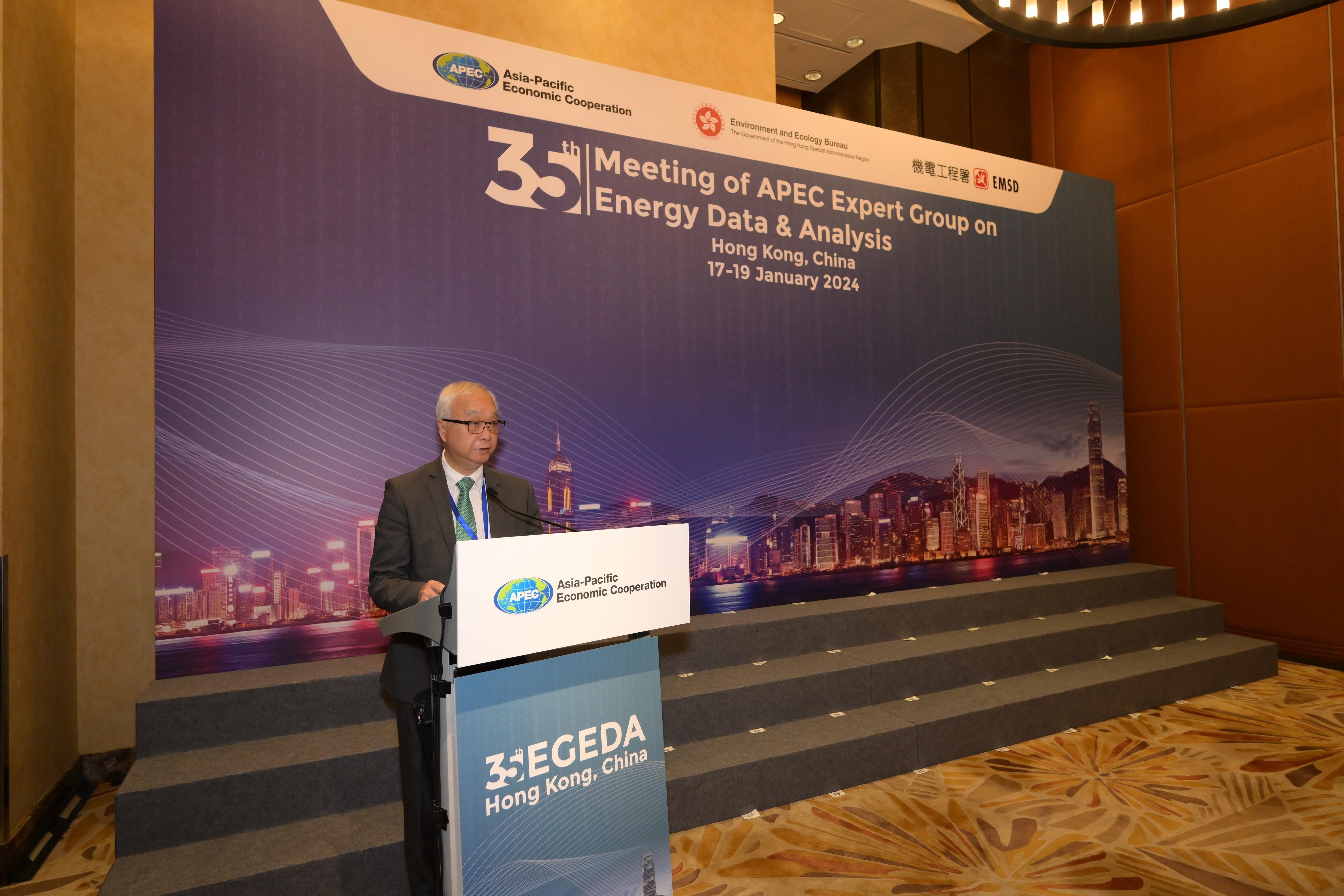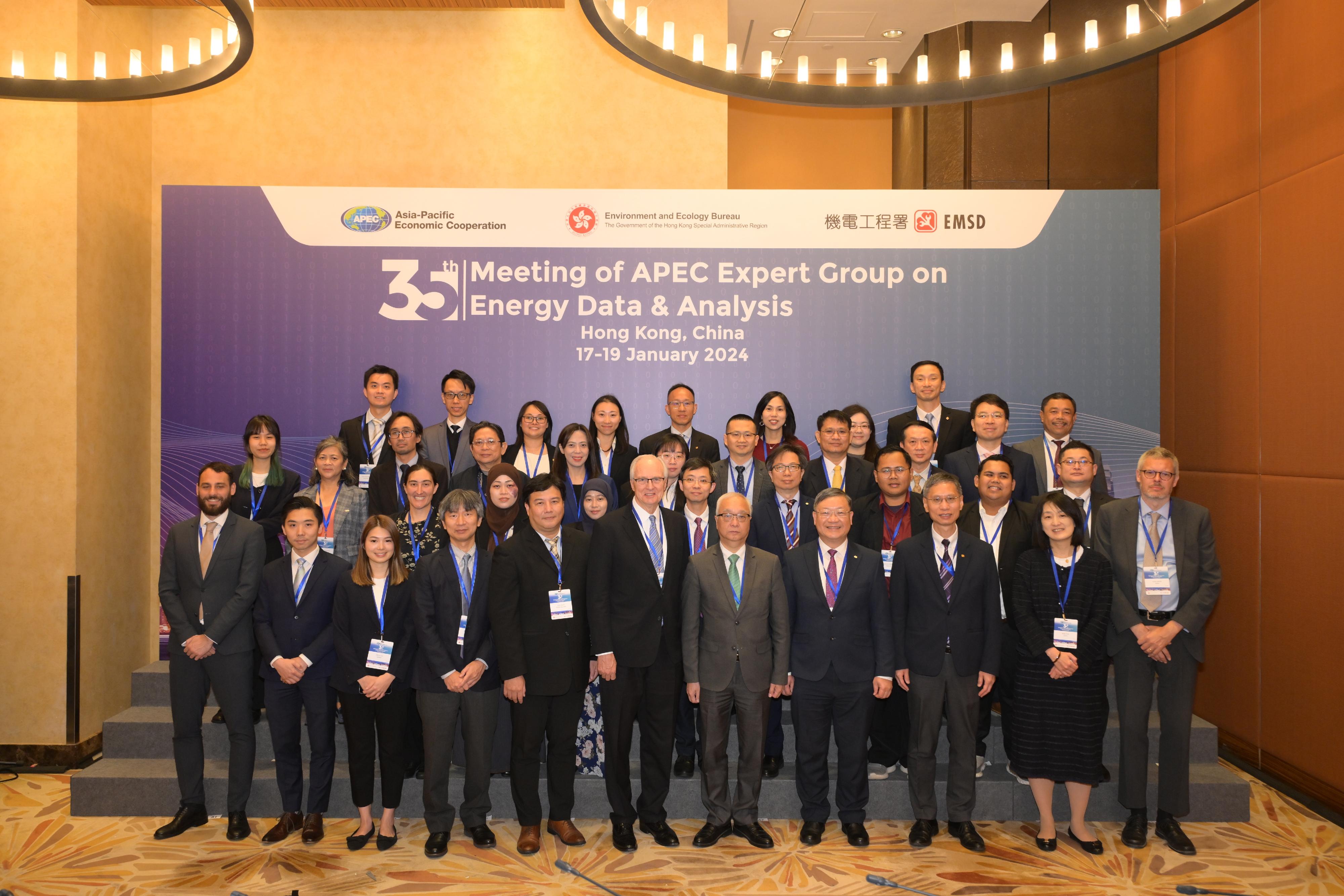Following is a question by the Hon Dominic Lee and a written reply by the Secretary for Environment and Ecology, Mr Tse Chin-wan, in the Legislative Council today (January 17):
Question:
The Government will implement the municipal solid waste (MSW) charging on 1 April this year, with charges to be levied by purchasing and using either designated bags (DBs) or designated labels (applicable to waste which cannot fit into DBs). However, it is learnt that many members of the public, residents' organisations, property management companies and private enterprises are not clear about the relevant arrangements. Regarding encouraging the public in practising waste reduction and recycling, will the Government inform this Council:
(1) whether it will consider, during the first six months of implementation of MSW charging, distributing 30 free DBs to each residential unit every month, so as to facilitate the public to adapt to the charging arrangements, thereby ensuring the smooth implementation of the relevant charging;
(2) whether it will provide additional resources (e.g. provision of DBs) to the relevant organisations of buildings as well as the District Service and Community Care Teams, so that such organisations can have sufficient resources to help promote MSW charging and encourage the public in practising waste separation and recycling;
(3) apart from the 12th Recycling Station under GREEN@COMMUNITY, which is expected to commence operation in the fourth quarter of this year, whether the authorities will set up more Recycling Stations so as to make waste separation a part of people's life;
(4) during the initial stage of implementation of MSW charging, whether the Government will increase the bonus points earned by members of the public who deliver recyclables to facilities under GREEN@COMMUNITY, in a bid to encourage their more active participation in waste separation and recycling; and
(5) as it is learnt that a number of cases have occurred earlier involving fly-tipping of construction waste or refuse on private land, in rural areas or on idle sites, and there are views that such a situation may be aggravated by the implementation of MSW charging, whether the Government has put in place a mechanism to prevent the occurrence of such a scenario after the implementation of MSW charging; of the government department responsible for law enforcement and instituting prosecutions in respect of the relevant non-compliant acts?
Reply:
President,
My consolidated reply to the questions raised by the Hon Dominic Lee is as follows:
(1) and (2) The policy objective of municipal solid waste charging (MSW charging) is to encourage the community to reduce waste at source and strengthen recycling efforts by creating financial disincentives through quantity-based charging, with a view to reducing the overall waste disposal amount. To be prudent in the use of public resources, we will focus on assisting households that genuinely require more support in adapting to MSW charging. The Government will distribute free designated bags (DBs) to residents of "three-nil" buildings, rural village houses and public rental housing (PRH) estates during the initial stage of implementation of MSW charging, taking into account that many of the "three-nil" buildings and rural village houses are old buildings without proper building management hence their residents might require longer time and more support to adapt to MSW charging as compared with residential buildings with property management companies. Moreover, residents of PRH estates account for about 30 per cent of the Hong Kong population with grassroots as the majority, and many of whom are the elderly. They might also need more backing to adapt to MSW charging and change their habits.
As for other private residential premises, property management, security or cleaning companies may apply for bulk purchase of DBs from the Environmental Protection Department (EPD) with the approval of relevant owners' organisations, and distribute the DBs to residents for use to facilitate the residents to adapt to the MSW charging arrangements. After the applications are approved, the EPD will offer a service fee equivalent to 3 per cent of the statutory price of each DB to applicants so as to cover their additional operating expenses.
Furthermore, we have arranged briefings for different building organisations (including the property management trade, cleaning companies and owners' organisations). As at end December 2023, the EPD has organised 52 briefings, reaching out to over 6 000 stakeholders. To facilitate the property management industry in better understanding the arrangements of MSW charging, the EPD is working with the Property Management Services Authority to organise continuing professional development seminars on MSW charging under its Continuing Professional Development Scheme, which are targeted at holders of the Property Management Practitioner Licence and representatives of licensed property management companies, to enhance their knowledge on MSW charging for handling property management duties.
The EPD's Green Outreach has commenced promotion for MSW charging in mid-August 2023 by providing support for waste reduction and recycling in the community and through promotional activities and on-site demonstrations at housing estates, residential buildings, GREEN@COMMUNITY facilities (such as Recycling Spots in old districts), etc, to engage different groups of citizens, including students, the elderly, housewives, residents of single-block buildings and "three-nil" buildings, foreign domestic helpers, ethnic minorities, etc, so as to enhance public understanding of MSW charging and educate citizens and frontline staff of housing estates and residential buildings to comply with the legislative requirements and proactively practise waste reduction and recycling for the implementation of MSW charging. As at end December 2023, the Green Outreach has organised about 900 promotional activities in relation to MSW charging, attracting over 90 000 participants, with the promotions covering housing estates and residential buildings which house around 60 per cent of the Hong Kong population. We are also discussing with the Home Affairs Department on promoting MSW charging through Care Teams in the 18 Districts at their respective districts.
(3) To encourage members of the public for the active participation in waste separation and recycling, the EPD has been expanding the community recycling network to strengthen support for recycling facilities at the district level. There are currently 11 Recycling Stations emphasising on both environmental education and recycling support, 34 Recycling Stores located in close proximity to residential buildings and over 130 Recycling Spots operating weekly at fixed time and locations in the form of kerb-side collection booths under the GREEN@COMMUNITY throughout the 18 districts in Hong Kong for the collection of nine common types of recyclables. These include glass containers, plastics, small electrical appliances, fluorescent lamps, rechargeable batteries and beverage cartons, which are lack of commercial recycling values. The service of GREEN@COMMUNITY has already covered about 80 per cent of the single-block buildings (including "three-nil" buildings) across the territory.
The 12th Recycling Station, GREEN@WONG TAI SIN, is currently under construction and expected to commence services in the fourth quarter of 2024. Moreover, GREEN@TSING YI, the first Recycling Store located inside an MTR station, will also commence services in the first quarter of 2024. The operator has already started providing Recycling Spots and housing collection services in Kwai Tsing district since October 2023.
The strengthening of the recycling support in PRH estates will support the implementation of MSW charging. The EPD is establishing small-scale Recycling Stores in 50 PRH estates progressively, thereby providing a more convenient means for PRH and nearby residents to practise clean recycling so as to complement the implementation of MSW charging. Three of the small-scale Recycling Stores have already commenced operation, including GREEN@KWAI FONG, GREEN@TAI WO HAU and GREEN@KAI YIP, with the rest of these Recycling Stores to commence operation gradually from this month onwards. The EPD will review from time to time the operation of all community recycling facilities and specific needs of individual districts for recycling facilities with a view to improving the service of the community recycling network.
(4) The implementation of MSW charging will help promote and encourage the public to actively participate in waste separation and recycling, thereby reducing the cost of purchasing DBs. We will closely monitor the recycling situation in the early stage of implementing MSW charging, and review and improve the measures including the GREEN$ Electronic Participation Incentive Scheme so as to further draw and encourage more members of the public to participate in clean recycling. Currently, the general public can use GREEN$ to redeem gifts and daily necessities. We plan to include DBs in the gift redemption list before the implementation of MSW charging. Details will be announced later.
(5) The Government is committed to enhancing the environmental hygiene and cityscape of Hong Kong. In 2023, the Government amended the Fixed Penalty (Public Cleanliness and Obstruction) Ordinance (Cap. 570) to raise the fixed penalty level for the scheduled offences under the Fixed Penalty Ordinance, with a view to enhancing the efficiency, effectiveness and deterrent effect of enforcement actions against environmental hygiene problems. To tackle illegal disposal of a large amount of construction waste or other waste, the fixed penalty for "unlawful depositing of waste" has been increased from $1,500 to $6,000. The relevant enforcement departments including the EPD, the Food and Environmental Hygiene Department (FEHD), the Agriculture, Fisheries and Conservation Department, the Leisure and Cultural Services Department, and the Housing Department will monitor the illegal waste disposal situation and take enforcement actions in accordance with their respective authorities.
The EPD and the FEHD have installed surveillance camera systems, which operate 24 hours a day, at more than 600 popular locations across Hong Kong for illegal disposal of construction waste or refuse. They use the information collected from the video footage to institute prosecutions and plan more effective law enforcement actions, so as to increase deterrence.
The FEHD will also adopt a risk-based approach and flexibly deploy internal resources to strengthen special cleaning and clearance operations at black spots of illegal refuse disposal in public places, as well as strengthening inspections and monitoring, etc.
Relevant departments have been maintaining close communication through inter-departmental collaboration, including exchange of intelligence, sharing of information and holding joint meetings, etc, to collectively monitor the overall illegal waste disposal situation and make concerted efforts to combat illegal disposal activities.

